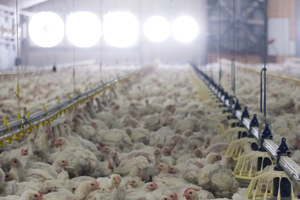UK animal welfare organisation targets poultry sector

Indoor broilers and caged laying hens are being highlighted by UK animal welfare organisation, RSPCA, as part of its Farm Animal Week – a campaign designed to draw attention to intensive farming, while raising funds for the society’s coffers.
“Few people realise that, although having their own individual personalities, farm animals can be kept in ways that wouldn’t be considered acceptable for pets,” said the RSPCA. “Caged hens, and many chickens reared for meat, are given a space per bird which is less than the size of an A4 piece of paper.”
As part of its campaign, it is asking supporters to “take the chicken challenge”, by standing on an A4 piece of paper for 20 minutes, and getting family and friends to sponsor them.
The RSPCA is also urging people to take a so-called “squashie” – a “selfie” photograph with as many people included in a single frame as possible. They are invited to upload them to Twitter and make a £3 donation by text message. Farm Animal Week 2014 is running from 29 September – 5 October.
“We want to see as many people as possible cooped up for a good cause – helping to unsquash chickens everywhere,” said a statement.
The RSPCA has also prepared a 23-page, downloadable lesson plan, to help teachers engage with Key Stage 2 pupils about farm animal welfare, while raising awareness of the Freedom Food scheme.
But the British Poultry Council has responded by pointing out that animal health and welfare are already core principles of British poultry production.
“The British Poultry Council, whose members produce 90% of the country’s poultry meat, works closely with Red Tractor to guarantee robust and responsible high-quality standards for poultry meat production in the UK,” said chief executive Andrew Large.
“These schemes go beyond the legislative requirements. The maximum stocking density for chicken reared under Red Tractor is 38kg/sq m. Great Britain has a limit of 39kg/sq m while in the rest of Europe it is 42kg/sq m.
“Consumers can be assured the chicken they eat has been reared to strict animal health and welfare standards,” Large concluded.
Source: Poultry World













